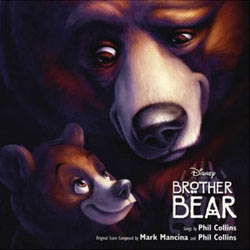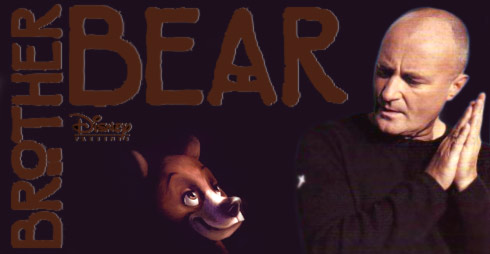- Article
- Read in 5 minutes
Phil Collins – Disneys Brother Bear – Soundtrack CD review
Disney releases a new soundtrack in 2003. Phil Collins was involved in both the songs and the score.
This is the second time Phil Collins provides a handful of new songs for a Disney soundtrack: Brother Bear is the title of the new film that will be in cinemas in March 2004. This time Phil Collins also worked on the so-called score (together with Mark Mancina), i.e. the music for the film besides the songs.
Phil Collins has written songs for Brother Bear that are on a par with Tarzan classics such as You’ll Be In My Heart or Strangers Like Me. Ballads like Look Through My Eyes, No Way Out and Transformation are inserted between a merry melodious On My Way, a pop-rock Great Spirit and the Motown-style Welcome. The album benefits from something Collins’s previous album lacked at times: Some parts of Testify sounded, apparently intentionally, like incomplete home demos. Brother Bear on the other hand is pleasantly mature. Has Collins spent more love on this project than on his Testify album? One could almost get this impression. Some of the musicians for Brother Bear also played on Testify: Jim Pierce played assorted guitars, Paul Bushnell plucked the bass on eight of the twelve pieces and Jamie Muhoberac played anything with a key on The Least You Can Do and Can’t Stop Loving You. Phil’s musical long-term companion on the guitar, Daryl Stuermer, does not play on this album at all.
 Drums: Phil Collins
Drums: Phil Collins
Bass: Paul Bushnell, Nathan East, Trey Henry, Jimmy Johnson, Kenny Wild
Keyboards: Jamie Muhoberac
Piano, Hammond B3 Organ: Tim Heintz
Guitars: Tim Pierce, George Doering, Tim May, Dean Parks
World Woodwinds: Pedro Eustache
Percussion: Luis Conte, Michael Fisher, Louis Molino III
Accordion: Frank Marocce
Bass Harmonica: Tommy Morgan
Programming: Carmen Rizzo, Dan Chase
Pro Tools-Computerprogramm: Doug McKean, Tal Herzberg
The CD booklet mentions many other people who did their share to make this project come through. We would like to mention the most important of them in lieu of the others:
Executive Music Producer: Chris Montan
Orchestration: David Metzger
Vocal Arrangements: Phil Collins, Mark Mancina, David Metzger
Choral Arrangements: Eddie Jobson
Orchestra Conductor: Don Harper, David Campbell
Further details below.
1. Look Through My Eyes(4:01)
Production: Rob Cavallo
arrangements: Rob Cavallo, Phil Collins
The Brother Bear soundtrack begins with a melodious ballad in 3/4, a time signature Collins uses very rarely (e.g. on Dance Into The Light or Come With Me). The overall sound resembles You’ll Be In My Heart, also because of David Campbell’s arrangements for the orchestra that he also conducts. This song is great, but the bombastic bit from 2:26 – 2:44 stands out with its Genesis-like bordune bass technique. The song “feels like Genesis in the early 90s” anyway (Bernd Zindler). Rob Cavallo previously produced the whole Testify album. Note the name of the mixer: Chris Lord-Alge is not to be confused mit Tom Lord-Alge who mixed Can’t Stop Loving You on Testify.
2. Great Spirits (3:24)
Production, arrangements: Phil Collins, Mark Mancina
La grande dame Tina Turner does a great job singing this pop/rock song – even at her tender age of 63. This is the first song on to use an acoustic western guitar that is used more than on previous Collins productions (cf. On My Way). The brief, almost Asian instrumental in the middle (2:31-2:42) has something of Tony Banks (listen to the instrumental bits on Turn It On Again or Cul-De-Sac from Duke). A version of Great Spirits where Phil Collins sings himself can be found on the American Best Buy version of the soundtrack – a must for all Collins fans.
3. Welcome (3:38)
Production, arrangements: Phil Collins
A gospel-like song begins with African drums. Pizzicato strings come in at the same time as the vocals. The chorus melody reminds the reviewer of the Tell Me Why chorus from Genesis’ studio last album with Collins, We Can’t Dance (1991). There is a very quiet, chromatic part in the middle (2:23-2:55) as a marked contrast to the rest of the song.
4. No Way Out (Single Version) (4:19)
Production, arrangements: Phil Collins, Chris Montan
A strong balled, and it reminds one of older Collins songs. The bit from 1:29 to 2:28 with the speed, harmonies and female backing vocals brings back memories of the …But Seriously classic Wish It Would Rain Down. The ending keeps up this impression. Some may feel that the production of No Way Out is too compact, but to others it may be what makes this song so great.
5. Transformation (2:30)
Production, arrangements: Phil Collins, Mark Mancina
Choir arrangements: Eddie Jobson
Choir coordination: Tanja Andreeva
Sparse, Peter-Gabrielesque percussion gives the first minute a meditative mood before The Bulgarian Women’s Choir captivates us with unusual Inuktitut lyrics (i.e. lyrics in one of the inuit languages). It is remarkable how far up the ladies can force their falsetto. The lyrics were translated by Lorena Williams. Collins accompanies all this with some tom-tom work in an intensity that he has rarely used in recent years. This is even more so in Phil’s own version (cf. song 9).
6. On My Way (3:41)
Production, arrangements: Phil Collins, Mark Mancina
This great song has a groove reminiscent of Don’t Get Me Started or the Serious tour live version of The Roof Is Leaking. It has such an interesting structure and choice of instruments that it is worth a detailed analysis:
00:00 – 00:19: intro, western guitar
00:19 – 00:57: first chorus, drums come in, accordion (!)
00:57 – 01:15: first verse (a la the Beatles song Lady Madonna)
01:15 – 01:34: second chorus
01:34 – 01:53: second verse (a bass mouth organ continues the Lady Madonna impression)
01:53 – 02:09: middle part A, (a bit like Styx’ Boat On The River)
02:09 – 02:38: middle part B, merry whistling
02:38 – 02:50: middle part C, orchestral rendition of the intro theme
02:50 – 03:41: third chorus, with banjo (a bit like The Roof Is Leaking, We’re Sons Of Our Fathers)
Astonishing how much can happen in a four-minute song. And by the way, Phil Collins played the Beatles classic Lady Madonna as an intro for Sussudio at his (terribly incompletely released) MTV Unplugged sessions.
7. Welcome (3:14)
Production, arrangements: Phil Collins, Mark Mancina
additional vocal production: Chris Goldsmith
This is a version of Welcome that is 24 seconds shorter than track 3; the first verse (with different lyrics) is only half as long. The percussion intro also differs from Collins’s version. The soulful vocals were provided by Blind Boys Of Alabama (featuring Oren Waters) with whom Peter Gabriel has also worked. Collins himself sings only during the quiet part that has not changed.
8. No Way Out (2:38)
Production, arrangements: Phil Collins, Mark Mancina
The fourth song comes again in a much shorter version with a much small arrangement. The chorus begins only after two verses. Some additional lines were inserted between the first and second verses. From 1:30 an unobtrusive song outro begins with melodies played on… oboe? flute? harp? bassoon?
9. Transformation (2:26)
Production, arrangements: Phil Collins
The third alternate version brings us Transformation without the Bulgarian choir. It is not only four seconds shorter, it also has a different intro and different percussion, backing vocals a la The Lion King and stronger, more powerful drums. Both versions are interesting and have earned their place on the soundtrack album.
10. Three Brothers (6:46)
11. Awakes As A Bear (6:48)
12. Wilderness Of Danger And Beauty(5:29)
composition: Mark Mancina, Phil Collins
Production: Mark Mancina
These three pieces are extracts from the score. They sound just like one would imagine the music for a Disney film: varied, dynamic, full of melodies, painting the images with sounds. This is the first time Phil Collins has written an orchestra score (with Mark Mancina). They have occasionally used bits from the songs (Look Through My Eyes, Transformation).
by Bernd Vormwald (with a little help from my friends)
translation by Martin Klinkhardt

